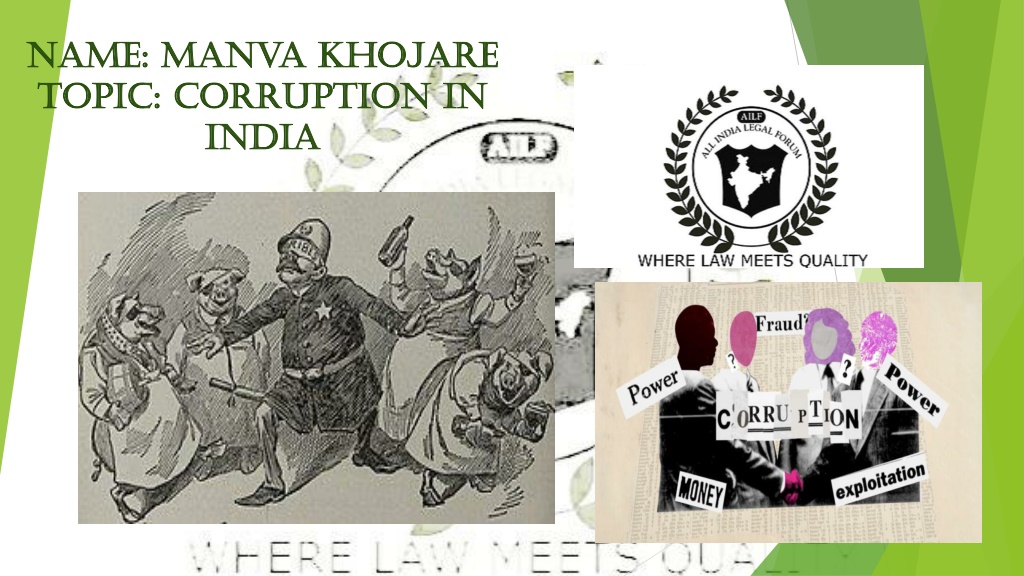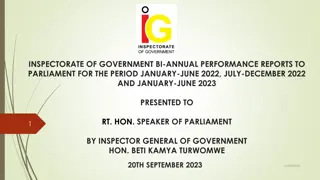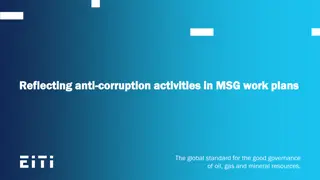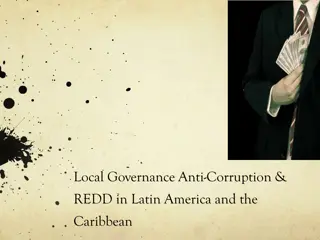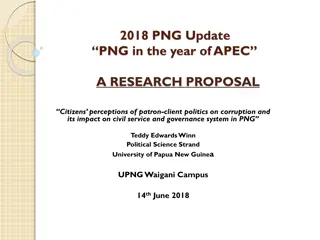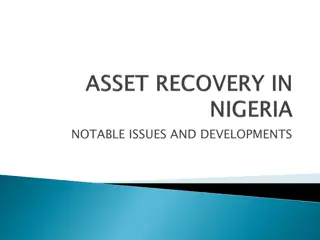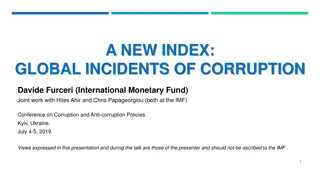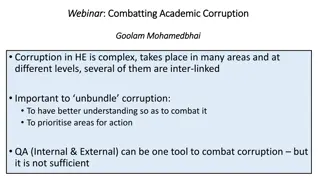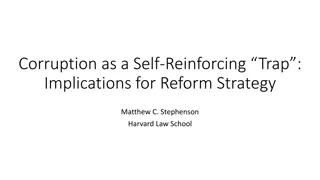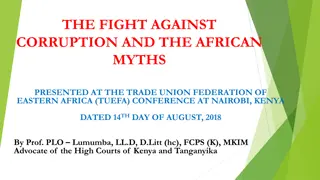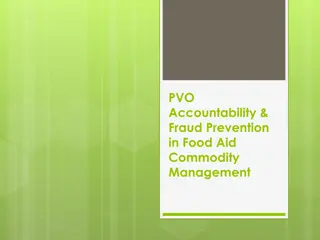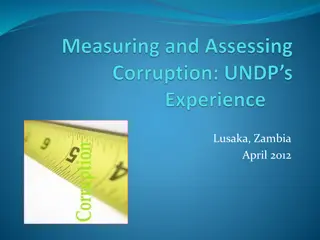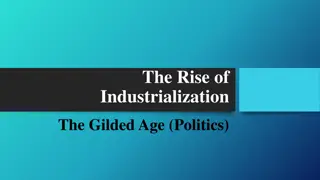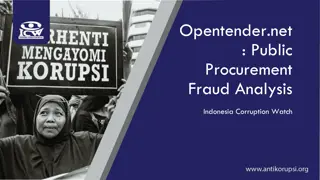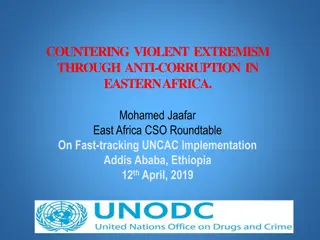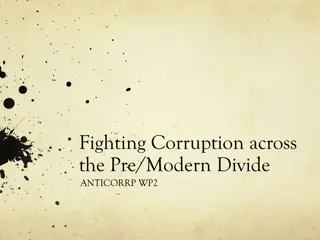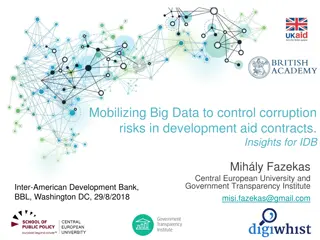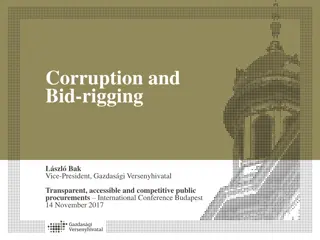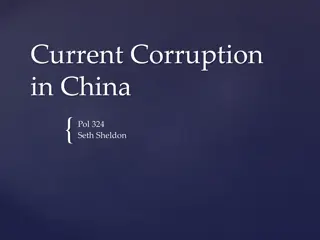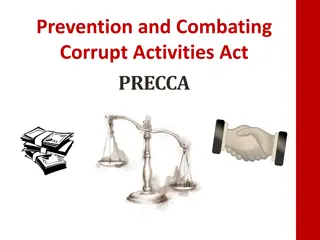Understanding Corruption in India: Causes, Effects, and Solutions
Corruption in India is a significant issue affecting the economy and society at large. This article explores the definition of corruption, its prevalence in India, key causes, major players involved, comparison with global standings, and methods employed. Lack of effective management, inadequate oversight, greed, and lack of transparency are identified as major drivers of corruption in the Indian context. Addressing this pervasive problem requires a multifaceted approach involving government reform, public awareness, and enhanced transparency measures.
- Corruption in India
- Causes of corruption
- Effects of corruption
- Solutions to corruption
- Government reform
Download Presentation

Please find below an Image/Link to download the presentation.
The content on the website is provided AS IS for your information and personal use only. It may not be sold, licensed, or shared on other websites without obtaining consent from the author. Download presentation by click this link. If you encounter any issues during the download, it is possible that the publisher has removed the file from their server.
E N D
Presentation Transcript
Name: Manva Khojare Name: Manva Khojare Topic: Corruption in Topic: Corruption in India India
What is Corruption? Dishonest or fraudulent act by those in power . In simpler words, it is the exploitation of public power for private benefit. What is Corruption in India? Corruption in India is a rising issue that is adversely affecting the economy of the central, state and the local government. Because of Corruption, not only the growth in economy got obstructed but it also curbed India s development.
Who is involved in corruption? There are various surveys and studies about which part of the population of the country is involved in corruption. It is observed on a large scale that police officers and government officials top the list.
Where does India lie in terms of corruption when compared with other countries? According to the 2019 s survey of the Corruption Perceptions Index(CPI), India ranks 80th in terms of corruption.
What are the causes of corruption? 1.Primary reason: lack of effective management 2.Unsupervised administration gives rise to small scale corruption which later results in large scale corruption 3.1. Inadequacy of good administrators 3.2. Unskilled and impotent executive heads in power leads to maladministration. 3.3. These inefficient elected heads too are a result of corruption 3.4. Thus, corruption rears corruption. 4.1. To increase the standards of living, poor people take refuge in wrongful acts like corruption. 4.2. Lack of financial stability creates insecurity and thus the financially unstable group falls prey to corrupt people.
What are the other major causes of corruption? Greed of personal Lack of benefit transparency Numerous Lack of government systems togetherness with obscure bureaucracy Complicated Inordinate government regulations functionaries
What are the methods of corruption? There are several methods of doing corruption. The prominent ones are discussed below: Bribery: offering or soliciting any item of worth(or a gift) to influence the activity in charge of (public) power. E.g. gift, free tickets, donations, secret commission, promotion, tip, etc. Favoritism: discriminatory privileged treatment to one person or a group at the cost of others. Influence Peddling: illegal practice of using one s power in government or simply using connections of person in authority to gain favored treatment. Also referred as, traffic of influence/ trading in influence.
Extortion: Acquiring profit through coercion(by threatening or forcing) Abuse of Discretion: An error of judgement by trial court in making a pronouncement that is distinctly unreasonable, contradictory or imprecise. Such judgements cannot be rationalized on the basis of the facts of the case. Graft: Graft is a form of political corruption. It describes the improper use of the power of the political leader for private gain. For e.g. funds released for a public project deliberately misdirected to maximize personal gain. Money laundering: It involves obtaining money illegally which is achieved through complicated process which may involve foreign banks.
Which agencies are involved in corruption? Government: Use of public power by elected executive heads for private gain. Bribery is commonly observed corruption method in government sectors. For e.g. The National Herald Corruption ongoing case against politician Sonia Gandhi and associated persons. Police: It comes into picture when police officers break their political contract and abuse their power through corrupt acts, corrupt behaviors to make people fall prey in act of corruption for personal interests, promotion, etc. Corruption in police departments is highly observed in India. The most recent instance was the custodial death of the father son duo in Tamil Nadu.
Judicial: It refers to the corruption observed in judicial systems where misconduct of judges takes place through acts like, accepting or giving bribes, illegitimate sentencing of criminals, prejudiced hearings and arguments in the court room. Education: In modern times, education institutions have become more money oriented and capitalistic. The most basic objective of training the youth of our country and providing them with eminent education is getting ignored day by day. Favoritism, networking, bribery is largely witnessed in the education sector.
Healthcare: Pivotal resources are driven away from the patient who is in utmost need of them. This results in poor quality of care and treatment which has deteriorating medical effects. Absenteeism is a major concern in healthcare corruption where medical staff and doctors don t attend the patients and still claim the salary. Human bodies are used for clinical experimentation without the patients knowledge. Various reputable hospitals generally demand and charge more money from the poor and illiterate strata of the society. Other prominent areas and sociological fields where corruption can be observed are the various Political units of a country, Labor unions , Religion, Philosophy, and Corporate departments.
What are the effects of corruption? The most pitiful effect of corruption is that, that the trust in trustworthy institutions gets disintegrated. In addition to this, citizens or the subjects of corruption lose faith in the judicial system in the country. A lot of financial loss is observed due to this. At the expense of private investments, magnitude of public investments increase. A deadly outcome of corruption is that it obstructs the economic growth and development of a country.
Due to healthcare corruption a lot of innocent people face treacherous medical problem and poor people of the country lead a more poverty stricken livelihood. In the employment and education sector, corruption has fatal effects, not only real talent is neglected but it also results in illiteracy, an increase in unemployment and also results in hunger and poverty. The organization s prestige also gets deteriorated.
Anti Corruption laws in India Laws for public servants if found guilty in the act of corruption: Prevention Of Corruption Act, 1980 1. In order to oppose corruption in government functionaries and public sector businesses in India. It extents and applies to whole of India. An Amendment Act was introduced in 2018 The trial shall be completed within 2 years which can be extended up to 6 months or 4 years if justifiable reasons are given Punishment in case of minimum imprisonment extends to 3 years and in case of maximum imprisonment it is 7 years, with or without the fine. A prior sanction is to be granted from the state or central government in order to investigate a public servant.
2.Indian Penal Code, 1860 Section 169 of IPC: oit states that if a public servant who unlawfully purchases or bids for a property, in his own name or in someone else s name or jointly with another person or in shares with others, shall be punished with simple imprisonment extending up to 2 years or with fine or both and the purchased property shall be confiscated. Section 409 of IPC: o It states that if a public servant or a banker, merchant, agent is found committing breach of trust, he shall be punished with imprisonment for life or with a term which may extend to 10 years and shall be liable to fine
Law to forbid benami transactions: The Benami Transactions(Prohibition) Act, 1988 Outlaws specific financial transactions A transaction can be called Benami when any property is transferred from one person to another for consideration paid by another person. As limited success was seen, amended versions were passed in 2011 and 2016 It s imprisonment extends up to 7 years and the accused shall be liable to fine for violation of Act which may be extended to 25%value of the Benami property. The government has set up 24 Benami Prohibition Units(BPUs) across India.
Law to resist Money Laundering The Prevention of Money Laundering Act, 2002 This law penalizes public servants under the offence of money laundering. It aims at controlling money laundering. The Act enables to confiscate the property gained through laundered money. The accused shall be punished with rigorous imprisonment which may span from 3 years to 7 years. If the crime committed involves any offence under paragraph 2 of part A then the punishment may be extended to 10 years. Also the accused has the burden of proof, i.e. he/she has to prove that the alleged proceeds of crime are lawful.
Conclusion: Hence, it can be concluded that corruption is present everywhere and almost in every sociological, political, governmental organization and institution. It affects largely on the economic development, results in poverty and hunger and many more factors affecting the growth of a country. Many laws and units have been installed to curb the phenomena of corruption. In my view, unity, transparency and absolutely no greed can help us eradicate corruption.
